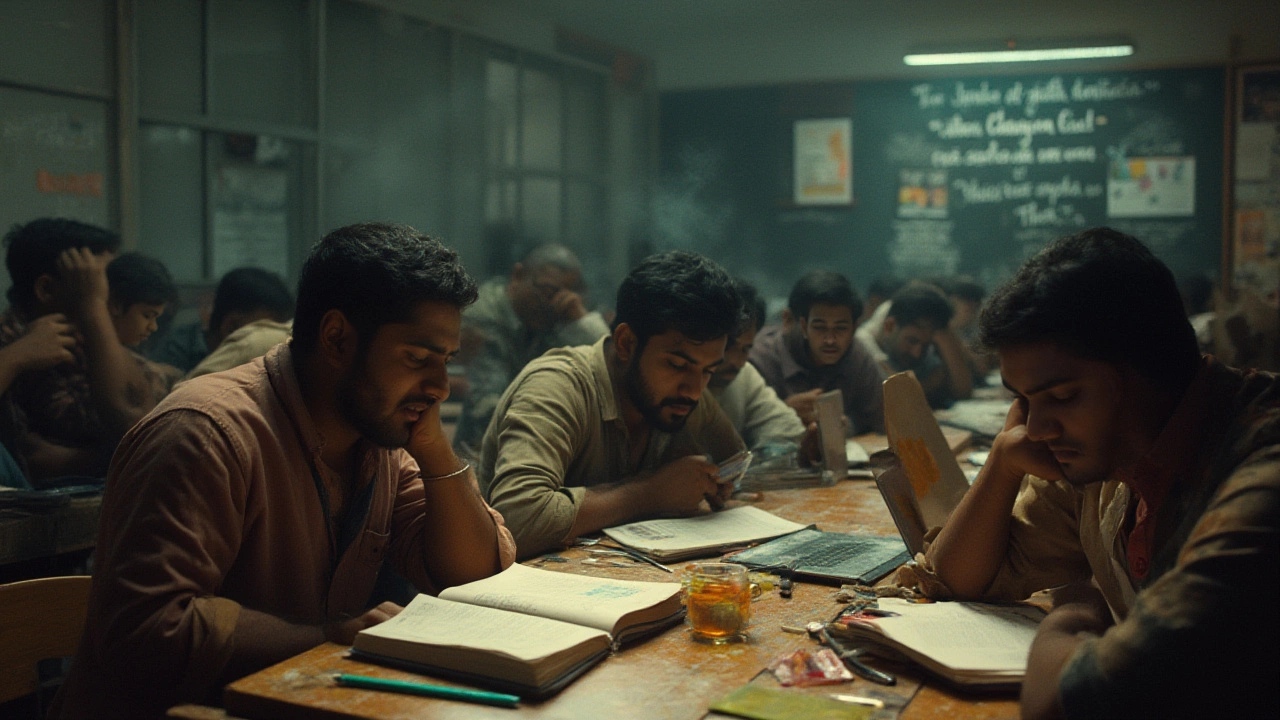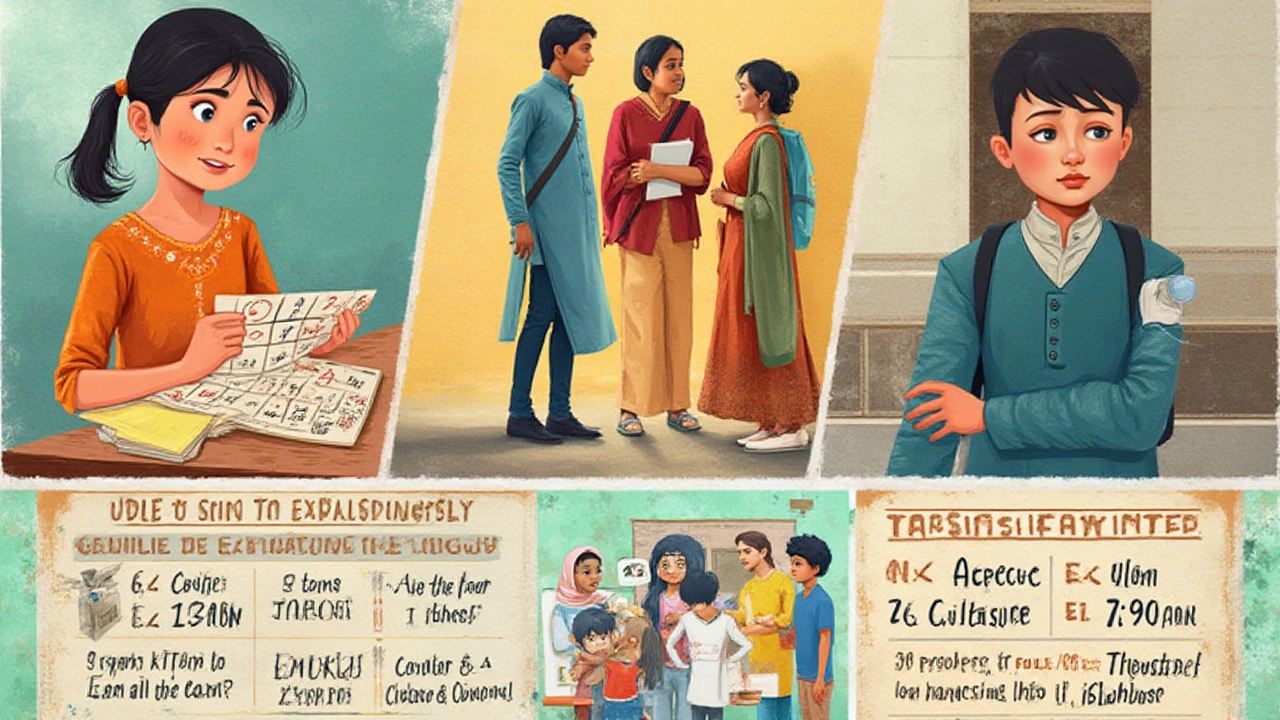
Picture the sweaty palms, midnight study marathons, and that sinking feeling you get walking into an exam hall with your future on the line. Across the world, millions are in a silent race for a handful of golden seats, battling mind-boggling questions. But which exam takes the crown for being the most competitive? The answer isn’t as simple as looking at one test—it’s a wild mix of tiny acceptance rates, insane pressure, and fierce competition that makes candidates almost superhuman. Grab a cup of chai (or coffee) and get ready—I’m breaking down the wildest exams people lose sleep over, and how to not lose your mind if you ever find yourself staring at one.
How the "Most Competitive" Exam Is Even Measured
When we talk about the most competitive exams, our minds often leap to names like JEE Advanced, UPSC CSE, and the SAT. But what really decides if an exam is the toughest out there? Dig deeper, and you’ll find it’s not just the pass rate. It’s the number of candidates, the intensity of the syllabus, the complexity of the selection process, and societal expectations. Sometimes, an exam with a relatively high pass rate can still be brutal, purely because the competition is so well prepared.
Let’s look at real numbers. The Joint Entrance Examination (JEE) Advanced in India sees over 200,000 students taking the paper, but just around 16,000 actually bag a spot in the prestigious IITs. Now, if you’re math savvy, that’s less than an 8% success rate. Meanwhile, the UPSC Civil Services Exam—responsible for selecting India’s bureaucratic elite—had 1,105,798 candidates in 2024, with only about 1,000 final hires. We’re talking about a 0.09% success. In Japan, the University of Tokyo entrance exam maintains a legendary reputation; only 1 out of every 10 pass.
Flip the globe: the Gaokao in China is chaos at an entirely different level. Every June, nearly 12 million students compete for fewer than 0.5% elite university seats. There are videos online showing parents camping outside test centers, and stories about kids taking practice tests since the age of five. The competition is insane, and some families even move cities for better odds. In the U.S., the SAT and ACT are a rite of passage for college hopefuls, but the most brutal gauntlets are for medical or law schools: less than 2% of applicants secure a spot in top-tier programs like Harvard or Yale.
So how do you measure “most competitive”? Here’s what really matters: applicant-to-seat ratio, complexity, psychological load, and how deep you need to dig to come out on top. Lower success rates, like Gaokao’s, always catch eyeballs. But add in factors like length of prep time (think: UPSC’s two years of all-day study) and the weight these tests carry for your future, and things get even trickier. It’s not just about the numbers—it’s about what’s at stake for each candidate.
- Most competitive exam isn’t always the one with the lowest pass rate.
- Preparation time, societal pressure, and the stakes play a mighty role.
- Many exams have multiple phases—written, interviews, even physical tests—piling on more layers.
- For most students, the journey is as competitive as the finish line.
If you want pure stats, here’s a quick list:
| Exam | Country | Applicants (2024) | Seats/Acceptances | Selection Rate |
|---|---|---|---|---|
| UPSC CSE | India | 1,105,798 | 1,000 | 0.09% |
| Gaokao | China | 12,000,000+ | 60,000 (elite) | 0.5% |
| JEE Advanced | India | 200,000+ | 16,000 | 8% |
| Harvard Law School JD | USA | 7,500 | 550 | 7% |
| University of Tokyo | Japan | 14,000 | 1,400 | 10% |
Inside the World’s Most Competitive Exams: Real Stories
Stats tell just half the story. To really get the feel for these tests, you have to peek into the actual lives of the folks who take them. You know those memes about students with bags under their eyes bigger than their future? The pain is real. My cousin in Delhi is prepping for the UPSC; he hasn’t watched a Netflix series since winter 2022, and his phone is full of notes rather than memes. Around exam season, students in India and China literally cut themselves off from social life—some log out of social media for months, living in the library.
You’ll hear about aspirin companies making a killing every June in China, thanks to Gaokao-induced headaches. One of my neighbors spent two years prepping for the IIT JEE, and he swears his dog Leo was his emotional support (mine certainly is). There was even a viral story in 2023 about a student sitting the Japanese civil servant exam for the fifteenth time before finally making it—talk about grit.
The psychological cost shouldn’t be underestimated. Burnout is a reality for lots of kids facing these exams, and mental health support is still a patchwork, especially in Asia. In some Indian cities, there are now “study hostels,” which are literally hotels converted for students who want no distractions—think libraries with beds and dinner service, and not much else. In South Korea, hagwons (private academies) prep students for the CSAT, and some close at past midnight. Dinner? Homework. Weekend plans? More practice tests.
So, why do so many sign up for this much pain? Prestige has a lot to do with it. Scoring well in these exams opens up big career doors and lifelong bragging rights. Many Indian parents will proudly remind you for years: “He cracked JEE Advanced in his first attempt.” On the other hand, some exams are genuinely a ticket out of poverty. In China, Gaokao is considered the ‘great equalizer’—a single chance to transform one’s life, especially for rural students. It’s not just a test, it’s a lifeline.
Strangely enough, some students find thrill in this academic gladiator arena. A guy from my school actually thrived under the pressure of the National Eligibility cum Entrance Test (NEET), claiming he “enjoyed the challenge.” Yeah, we all teased him, but hey, he made it to a top medical college.
For applicants in countries like the U.S., the challenge comes with balancing extracurriculars, essays, standardized tests, and AP classes. Some of my American friends juggle sports, music, community service, and SAT prep, just to stand a chance at Ivy League. In Europe, things are more streamlined but still no walk in the park. Think about Oxford’s entrance interviews—just as famous for their quirky questions as their rigor. “If you could save just one historical figure from being erased, who would it be and why?”

Busting Myths About Tough Exams
If you ask around, people love to exaggerate. “JEE will melt your brain,” “Gaokao marks are everything,” or “Only the geniuses survive UPSC.” But it’s not all true. There’s lots of hype, but plenty of regular folks clear these exams with the right strategy and support. The misconception that only super-geniuses can make it through is a big mental block for many. I know folks who weren’t top of their class, never went to fancy coaching centers, but made it through because they studied smart, not just hard.
Here’s another myth: you need to sacrifice your happiness for years. While you’ll need to buckle down for long stretches, taking breaks and having hobbies (even if it’s just walking your dog or binge-watching Leo chase his own tail) can actually help. A Cambridge study in 2022 showed students who took regular breaks and stayed physically active had better retention and less anxiety.
It’s also easy to believe that failing a major exam ends your chances forever. But life isn’t a Bollywood drama. Loads of successful people didn’t ace their exams but found other paths—startups, smaller colleges, government jobs, or even opportunities abroad. India’s tech world is full of folks who didn’t get into an IIT or clear UPSC and are still running unicorn companies.
One more wild take: “Cramming at the last minute works best.” If there’s any hard rule, it’s that marathon prep always beats a 24-hour sprint for these mega-exams. Consistency wins. The ‘study till dawn’ culture is overrated and a sure ticket to burnout. It’s not about how many hours you clock—it's how focused and effective those hours are.
- Smart schedules beat endless hours. Quality over quantity.
- Group study can be helpful—but only if it’s disciplined.
- Mental health help is just as important as coaching classes.
- Adapting your strategy if you’re stuck is key.
The pressure is intense, but nobody talks about self-kindness. Give yourself permission to fail, learn, and try again. It’s not the easiest lesson, but it’s the most important.
Tips for Surviving (And Succeeding!) in Super Competitive Exams
Alright, so you’re signing up for the academic equivalent of a tough mudder race. Here’s what can help you get through with your brain, body, and sense of humor mostly intact.
First up: make a realistic study plan and actually stick to it. You’ll want to figure out the syllabus, break it into manageable chunks, and don’t forget to schedule breaks. Remember, it’s a marathon, not a sprint. Apps like Notion and Google Calendar can be your secret weapons. Keep the big picture in sight, but focus on grinding through one week—or even one day—at a time.
Second, test yourself. Take mock exams as if your results depend on it. Time-bound practice helps you deal with nerves and expose weak spots. For JEE and UPSC, previous year question papers are gold. Gaokao and NEET have dedicated mock test books that students swear by. The feedback you get from self-testing is way more valuable than endless passive reading.
Find a support system. Parents, friends, teachers, or even study groups (online and offline) make a huge difference. When you hit a wall, it’s the pep talks and the shared “we’re doomed!” memes that get you through. Don’t underestimate how far a quick walk with your dog (hello, Leo!) or a call with your best friend can push you.
Eat well and hydrate. Junk food binges might be tempting during stressful weeks, but stable blood sugar is your hidden weapon. A study from Stanford in 2023 showed a clear link between high sugar consumption and reduced mental alertness during finals. You’re not aiming for a six-pack, but your brain needs real fuel.
Finally, sleep. It feels like a luxury during peak prep time, but pulling all-nighters is almost always counterproductive. Consistent, restful sleep is where your brain processes and locks in knowledge. No, you can’t trick your body with caffeine forever. I tried—didn’t work.
- Break big goals into daily to-dos.
- Mock tests > endless reading.
- Group chats and peer support for stress relief.
- No shame in mental health support—see a counselor if you’re burning out.
- Celebrate little wins. They keep you motivated for the next round.
And hey, don’t forget to reward yourself. Yell your triumphs to the sky, and if you fail, take a breather before picking yourself up. Exams are a big deal, but your worth isn’t just a number on a results sheet.
So, next time someone complains that their test was the "world’s toughest," you’ll actually have the receipts to back that claim up—or kindly set the record straight. The world of hyper-competitive exams is brutal, but not unbeatable. Just remember, thousands walk this path every year, and some even come out the other side smiling.
